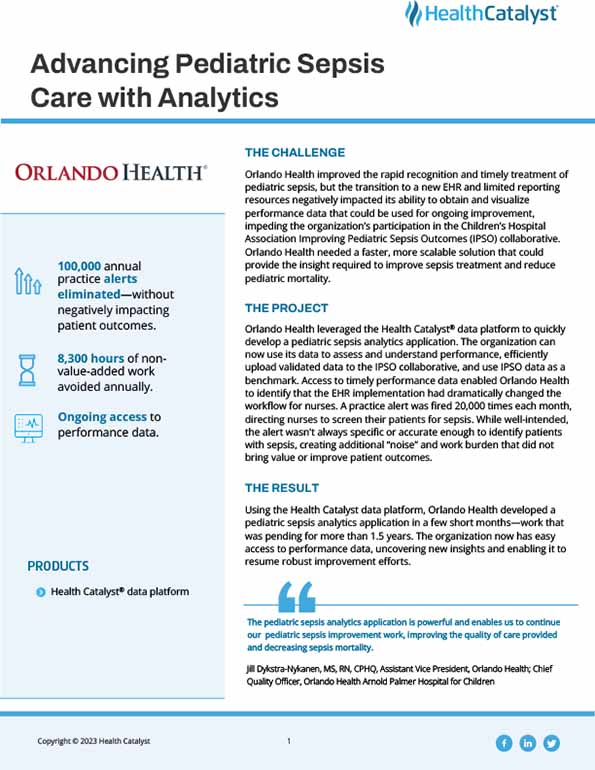Orlando Health improved the rapid recognition and timely treatment of pediatric sepsis but sought a faster, more scalable solution that could provide the insight required to improve sepsis treatment and reduce pediatric mortality. The organization leveraged the Health Catalyst® data platform to quickly develop a pediatric sepsis analytics application. Orlando Health now has easy access to performance data, uncovering new insights and enabling it to resume robust improvement efforts.
Orlando Health improved the rapid recognition and timely treatment of pediatric sepsis, but the transition to a new EHR and limited reporting resources negatively impacted its ability to obtain and visualize performance data that could be used for ongoing improvement, impeding the organization’s participation in the Children’s Hospital Association Improving Pediatric Sepsis Outcomes (IPSO) collaborative. Orlando Health needed a faster, more scalable solution that could provide the insight required to improve sepsis treatment and reduce pediatric mortality.
Orlando Health leveraged the Health Catalyst® data platform to quickly develop a pediatric sepsis analytics application. The organization can now use its data to assess and understand performance, efficiently upload validated data to the IPSO collaborative, and use IPSO data as a benchmark. Access to timely performance data enabled Orlando Health to identify that the EHR implementation had dramatically changed the workflow for nurses. A practice alert was fired 20,000 times each month, directing nurses to screen their patients for sepsis. While well-intended, the alert wasn't always specific or accurate enough to identify patients with sepsis, creating additional “noise” and work burden that did not bring value or improve patient outcomes.
Using the Health Catalyst data platform, Orlando Health developed a pediatric sepsis analytics application in a few short months—work that was pending for more than 1.5 years. The organization now has easy access to performance data, uncovering new insights and enabling it to resume robust improvement efforts.
"The pediatric sepsis analytics application is powerful and enables us to continue our pediatric sepsis improvement work, improving the quality of care provided and decreasing sepsis mortality."
- Jill Dykstra-Nykanen, MS, RN, CPHQ, Assistant Vice President, Orlando Health; Chief Quality Officer, Orlando Health Arnold Palmer Hospital for Children


